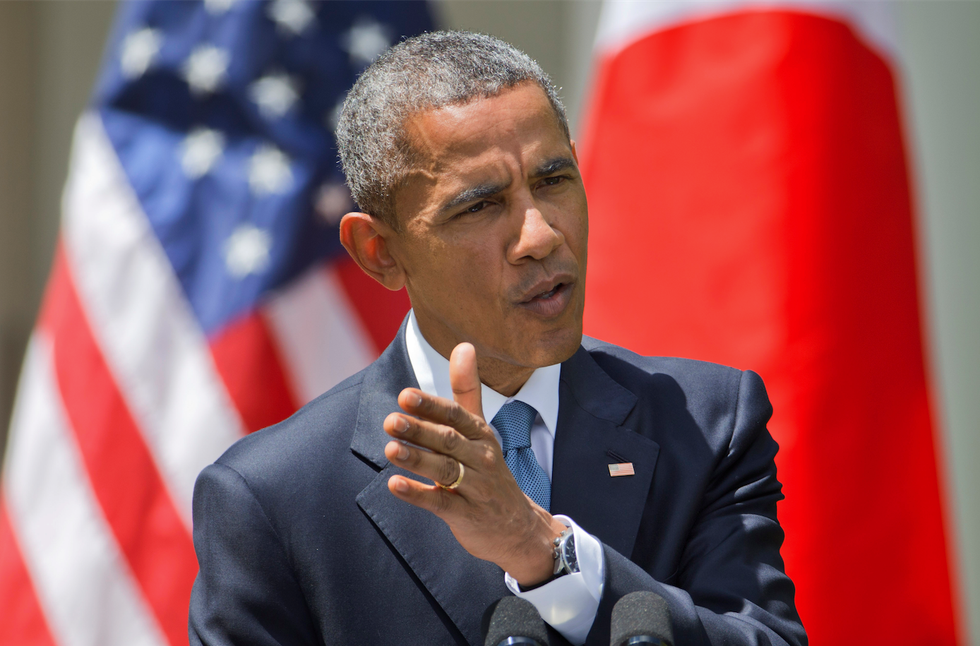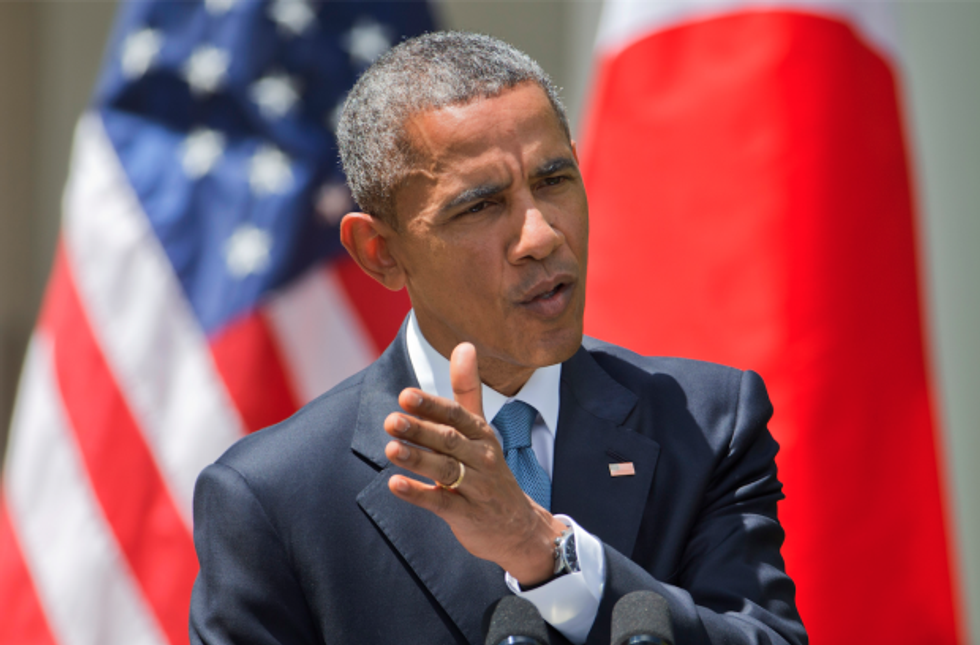
President Barack Obama speaks during a joint news conference with Japanese Prime Minister Shinzo Abe, Tuesday, April 28, 2015, in the Rose Garden of the White House in Washington. (AP Photo/Jacquelyn Martin)

In "You Only Live Twice" (1964) James Bond is challenged by Japanese super-spy Tiger Tanaka that Britain is abandoning its international responsibilities: “You have not only lost a great empire, you have seemed almost anxious to throw it away with both hands…”
Bond ripostes that the British are “not doing too badly,” Tanka charges, “That is the crybaby excuse of a boy who gets a thoroughly bad end-of-term report. In fact you are doing very badly indeed in the opinion of your few remaining friends.”
Tanaka’s charge, of shirking one’s responsibilities and alienating one’s friends, was leveled at Barack Obama this week by The Economist’s cover story, “Is America losing the Middle East?”

The Economist argues that Obama’s “deliberate neglect risks making” the situation worse. Indeed, observers around the world were not surprised, but nonetheless were mortified, when President Obama told the G-7 on June 8 that, “We don’t have a complete strategy…” for dealing with Islamic State in Iraq.
How is it that the President Obama, four years into Syria’s civil war, the second Arab Spring, and the gradual disintegration of Iraq, is still shrugging his shoulders without a strategy for crushing the international threat represented by Islamic State?
After the outcry over the G-7 remarks, the U.S. announced on June 10 that it would send an additional 450 trainers to assist Iraqi forces. Thoughtful observers see through this as little more than a PR manuever. The Los Angeles Times rightfully headlined this as a "shift in tactics," because it is decidely not a shift in strategy. Similarly, The New York Times calls it a "boost" but quotes Defense Secretary Ash Carter as averring, "This does not represent a change in mission."
Why so little energy? Why so little investment? Why Obama's reluctance to lead?
Tiger Tanaka’s analysis is useful.
First, Tanaka is critical of a superpower willfully walking away from its responsibilities, “anxious to throw it away.” This is precisely the policy preference of Barack Obama since taking the White House: Disengage military from the greater Middle East and Central Asia; leave the Libyans to their fate; cold-shoulder the Israelis; and lecture (but not help) the Egyptians and Saudis. Obama has claimed a “pivot” toward Asia-Pacific, but there is little evidence of a substantive build-up there as he as pulled military resources from the Middle East. The hard-fought gains of the military surges in Iraq and Afghanistan at the end of the Bush administration seem like distant memories now, eroded by the deliberate weakening of American resolve and resources.
Tanaka reminded Bond that strong leaders naturally have friends and allies, but when they recoil from leading, they find themselves isolated.
For the past five years the Obama administration’s signals have been timid and caused uncertainty, whether in response to Russian aggression on the borders of NATO; Chinese aggrandizement on the margins of allies like Japan, the Philippines, South Korea, and Taiwan; or in the greater Middle East. The situation today is that many U.S. allies seem to be working at cross-purposes because everyone must seek their own self-interest when there is no hegemonic power willing to lead.
For instance, Turkey and Iraq cannot coordinate against Islamic State while Qatar and Saudi Arabia continue to privately be at odds over regional security. The lack of coordination and leadership is true in Central Asia, the Far East, as well as in the Western hemisphere.
Tanaka argued that getting side-tracked by domestic affairs can cause a government to lose sight of its most compelling priorities. The context of Tanaka’s critique was the obscene growth of the welfare state and the loss of government leadership at home in 1960s Britain.
Certainly the Obama administration would much rather focus its energies on climate change, re-writing marriage codes, Obamacare, and the redistribution of national wealth. For instance, just before leaving for the G-7 summit this week, the White House made a major announcement that it officially endorsed same-sex marriage; the major G-7 initiative this weekend was not a strategy to defeat Islamic State and violent Islamism everywhere, but to curtail climate change.
Finally, Tanaka argued—not unlike Edward Gibbon in "The Rise and Fall of the Roman Empire"—that hedonism, materialism, and immaturity was causing the dissolution of the ethic of responsibility. Tanaka critiqued, “We now see a vacuous, aimless horde of seekers-after-pleasure … whining at the declining fortunes of the country, and wallowing nostalgically in gossip about the doings of the Royal Family and your so-called aristocracy in the pages of the most debased newspapers in the world.”
Change the “Royal Family … aristocracy” to read “Kardashians and Hollywood” and Tanaka seems to have hit upon a point relevant for today’s American public.
In other words, President Obama has not had sustained pressure from the American people to take global security—and our own security—seriously. The American people have trusted their national leaders to manage global affairs while the citizenry watch Bruce Jenner, "50 Shades of Grey," and the latest summer blockbuster.
Even domestic terror attacks and attempted attacks, from Major Nidal Hassan to Islamic State recruits, have not galvanized the Obama administration to lead in the greater Middle East. But that does not mean that no one is leading. Into that power vacuum in the Middle East, has marched Iran.
One wonders what Tiger Tanaka would have thought of that.
Eric Patterson, Ph.D. is Dean of the School of Government at Regent University in Virginia Beach, Virginia. He is the author or editor of 1 books, including "Ending Wars Well" and "Ethics Beyond War’s End."
–
TheBlaze contributor channel supports an open discourse on a range of views. The opinions expressed in this channel are solely those of each individual author.